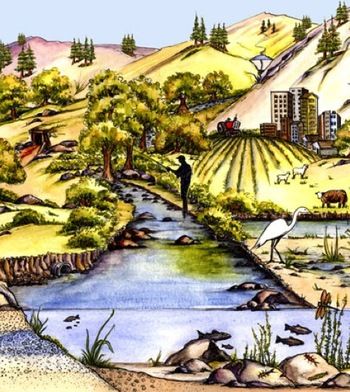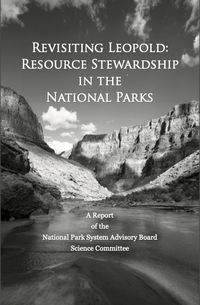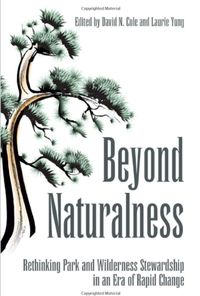
Publisher:
Bonnie King
CONTACT:
Newsroom@Salem-news.com
Advertising:
Adsales@Salem-news.com

~Truth~
~Justice~
~Peace~
TJP
Feb-01-2021 22:22

 TweetFollow @OregonNews
TweetFollow @OregonNews
Wildlife & The Manager Syndrome in America
Roger Gonzo Bütow, Salem-News.com“One of the penalties of an ecological education is that one lives alone in a world of wounds.” Dr. Aldo S. Leopold
 Image Source: California State Water Resource Control Board |
(LAGUNA BEACH, Calif.) -
My Back Pages by Bob Dylan
Many eco-protectionists came under the influence of the SOCIAL ECOLOGY movement in the 1960s, ditto for me in my earliest formative years (1997—2000) as I transitioned from general contractor to community activist to my current career as a professional land use consultant and enviro-analyst.
At first semi-ignorant, I came to understand that SE’s conflicted philosophy is steeped in, rife with socialist reformers, some endorsers of anarchy and communism.
After a few rookie years I became disenchanted with though surrounded by sycophants and worshippers of that philosophical school, the altar being a few miles up the road at the University of California Irvine: https://en.wikipedia.org/wiki/Social_ecology
SE when fully launched triggered a backlash, a countervailing, philosophical movement led by Dr. Arne Naess of the University of Oslo, Norway, termed DEEP ECOLOGY in the next decade: https://en.wikipedia.org/wiki/Deep_ecology
Predictably, feeling threatened, as day follows night, this led the SE leader Murray Bookchin and his fellow proponents to a defensive, devolving tactic in the 80s, a series of multi-pronged attacks diminishing, devaluing DE’s basic tenets and principles.
I eventually changed horses, pivoted from SE to DE, as it resonated, was and remains more closely aligned with my own father Hermann’s view.
The emphasis being on the intrinsic core values he learned as a boy growing up in Swakopmund, a coastal colony in then German Southwest Africa (now Namibia), what he instilled in me and our family: “Wilderness for its own sake.”
In my 23 years as an enviro-actionist, evolving from in-your-face, hair-on-fire activist zealot, a stereotype I fought, to professional analyst and consultant seeking action on eco-stewardship issues, my influences, like the science behind what I’ve noted above, have changed dramatically. I always thought myself more positive imaged Johnny Appleseed than proselytizing John The Baptist.
My personal opinions, eco-conclusions and even the Mission Statement of the NGO I founded in 1998, CLEAN WATER NOW, moved towards major sea changes beginning about 2011. www.clean-water-now.org
Recently I was informed by my closest lady friend that she thinks I’m a “thought leader.” Impossibly more cynical and sarcastic than I am, sharp mind and tongue, quick on the draw, easily on par and as funny, I wasn’t sure if she was pulling my leg, so laughing, thinking it an absurd concept, I had to look it up: https://brandyourself.com/blog/guide/what-is-thought-leadership/
Which, btw, I’m very uncomfortable with that phrase as I sense narcissism, inherent contradiction in the sobriquet. I’m with Bob Dylan on this one too: “Don’t follow leaders, watch the parking meters.” (Subterranean Homesick Blues).
I’ve seen what parking meters do, what clutter and paeon to greedy coffers they mean here in my tourist trap, year-round destination hometown of Laguna Beach. And aren’t we unfortunately all too familiar with the abject failures of self-described, self-anointed “leaders?” The word “influencer” == Affectatious, presumptuous, narcissistic phony poseur IMHO.
I don’t FEEL like I’m leading anything, am a major “influencer” in my field, but then too I’m so immersed and intent on creating a better future for both the water supplies and enhanced watershed protection in South Orange County (SOC) that I don’t have time to reflect much.
The word “influencer” obviously rubs me the wrong way, kind of makes me bilious, notably if self-titled. Like “Eco-warrior,” or “hero,” I think others must dub you, crown you, NOT doing it yourself like local loser James (Lame-O) Pribram who I wrote about years ago: http://www.salem-news.com/articles/august142011/ego-warrior-rb.php
OTOH, those who’ve influenced me most in the past 10+ years aren’t the same as the previous, initial half of my journey. I’m still jaded and have a jaundiced eye. Instead now I see the challenges from the regulated side of the equation due to my client portfolio, resulting interactions with staff and boards of water industry agencies.
I’d name these individuals but obviously that’d be problematic and unfair, perhaps some form of guilt by association, knowing that revelations can lead to controversies.
Even though I’ve completely rebuilt, rebooted, rebranded CWN into a more palatable and accepted NGO, there’s always those who niche, who stereotype formerly controversial people like myself and their organizations. Who also never forgive or forget a perceived slight.
Many hold me in low esteem like a fly in amber, stuck in THEIR past not mine. Oddly, when I started CWN we were considered whacko extremists, Birkenstock-wearing, tofu munching, tree hugging Druids. Dreaded when we showed up.
My journey has always been about saving the last best places, and the further up the food chain the more I realized the commitment to “managing” resources was a given that irked me. Worse, public agencies try to “manage” stakeholder opposition, i.e., control, contain and marginalize.
I can reveal that the major four people who I’d consider mentors, who’ve had the greatest influence upon me for said 10+ years don’t look at themselves that way: Two (2) are excellent engineers by trade and very capable general managers of local water districts, one is a highly gifted hydrogeologist/basin hydrologist now in charge of an entire environmental protection sector of the Northwest, and one a brilliant biologist currently employed as the environmental director at a major wastewater JPA. Don’t get me wrong, that obnoxious former self, the rebel-with-a-cause in me loved watching officials dive under their tables in terror at hearings when me (deemed the bête noire of water related issues) and my posse entered the room. But that was then, this is now. Back when I realized the bad guys would never like me or what I represented, but fear might motivate them to buffer and blink.
My educational journey led to a personal evolution, while science and comprehension evolved even more rapidly, both qualitatively as well as quantitatively, challenging myself and others to keep up.
One of my biggest gripes is that many of the “movements” now entail total commitments to corporate management style strategies like the catchall buzz phrase “Adaptive Management.” And the big lie in it, “conflict resolution.” Trust me, that seldom happens, maybe a cessation of irreconcilable differences, lower hearing room temperatures and temporary quelling of hostilities---until next time.
In the case of America’s eco-systems, whether within or outside of our National Parks, perhaps “managing natural resources” is unobtainable, in dire need of a complete re-thinking? Unfortunately, it’s a given: These theorist scientists and authors have already bought into the “management” template, that everything can and will be made well, whole or function at a higher, more perfect plane if “managed,” i.e., controlled and run by establishment staff.
No one seems to feel motivated, to mull over how committed America is to management at every level without assessing the downside. Example: Try “managing” the mercurial, never-know-what’s-coming-next body of water I live near, the Pacific Ocean. Maybe “Mother Nature” isn’t so predictable, is too capricious, variables morphing as I write, can’t be managed, at least using those previous, “same old, same old” analyses and their attendant, designer environmentalist methodologies.
My reading and research lists reflect my changing philosophical and pragmatic attitude, my view of modern contestations, many of which cannot be mitigated nor avail themselves of simplistic resolution, cures or remedies: “That depends” is a common utterance by one of my inland engineer/GM mentors and one of his other favorites is Aristotle (whodathunkit, a nationally acclaimed engineer quoting one of the patriarchs of Western philosophy?):
“It is the mark of an instructed mind to rest satisfied with the degree of precision which the nature of the subject admits, and not to seek exactness where only an approximation is possible.”
The other engineer/GM I’m grateful to has an incredible historical portfolio, having dealt with SOC coastal water-related issues like potable, recycled and wastewater for many decades. A great resource, regarding ocean outfall discharges from treatment plants and impairments, permits, my personal Encyclopedia Oceanica.
The hydrogeologist, formerly a SOC neighbor and frequent attendee at many of the same meetings, relocated to the Northwest, so I bug her by phone and by email. She’s measured, methodical and patient beyond the pale, never looks down on my ignorance pompously nor denigrates my steepest of learning curves.
The biologist is just under half my age, gives me actual homework (quintessential teacher, she doesn’t ask, she assigns), most of which is over my head, my paygrade or formal education but I slog my way through---This is the curse of a liberal arts vs. science major! And she’s merciless, but extremely informative and patient.
Here are my latest reading assignments provided by the biologist, I hope it triggers some research on the browser’s part, at minimum piques interest, inspires some curiosity.
 The theme, the context and importance to me for all three (3) are the quandaries surrounding said “management of natural resources,” lessons learned if any, a form of intellectual, science-based adaptation to newer, emerging methodologies and inputs.
The Leopold Report, officially known as Wildlife Management in the National Parks, is a 1963 paper composed of a series of ecosystem management recommendations that were presented by the Special Advisory Board on Wildlife Management to United States Secretary of the Interior Stewart Udall: https://en.wikipedia.org/wiki/Leopold_Report
The theme, the context and importance to me for all three (3) are the quandaries surrounding said “management of natural resources,” lessons learned if any, a form of intellectual, science-based adaptation to newer, emerging methodologies and inputs.
The Leopold Report, officially known as Wildlife Management in the National Parks, is a 1963 paper composed of a series of ecosystem management recommendations that were presented by the Special Advisory Board on Wildlife Management to United States Secretary of the Interior Stewart Udall: https://en.wikipedia.org/wiki/Leopold_Report
Named for its chairman and principal author, zoologist and conservationist Dr. Aldo Starker Leopold, the report proved influential for future preservation mandates: https://en.wikipedia.org/wiki/A._Starker_Leopold
In 2012, an updated version became available: REVISITING LEOPOLD: RESOURCE STEWARDSHIP IN THE NATIONAL PARKS This constituted a revisiting, a revisioning of previous beliefs and strategies... it was also a recalibrating and frank “devil’s advocate” self-critique. Much had changed during the nearly 50-years subsequent to the original.
 Engineering Eden is a book that addresses the larger narrative of the futile, sometimes fatal, attempts to remake wilderness in the name of preserving it.
Engineering Eden is a book that addresses the larger narrative of the futile, sometimes fatal, attempts to remake wilderness in the name of preserving it.
Tracing a course from the founding of the national parks through the tangled 20th century growth of the conservationist movement, the author gives the lie to the portrayal of national parks as Edenic wonderlands unspoiled until the arrival of Europeans.
It shows how virtually every attempt to manage nature in the parks has only created cascading effects that require even more management.
 Beyond Naturalness brings together leading scientists and policymakers to explore the concept of “naturalness,” its varied meanings, and the extent to which it provides adequate guidance regarding where, when, and how managers should intervene in ecosystem processes to protect not just our parks but pockets of national wilderness in general.
Beyond Naturalness brings together leading scientists and policymakers to explore the concept of “naturalness,” its varied meanings, and the extent to which it provides adequate guidance regarding where, when, and how managers should intervene in ecosystem processes to protect not just our parks but pockets of national wilderness in general.
I sincerely believe in self-education, being an autodidact, learning on my own. S-N.com readers might want to try doing the same? Frankly, all of this lock down time, nearly prisoners in our own domiciles due to Covid, this calamity has created opportunities for self-instruction.
That is if you’ve still a grain of the curiosity you felt when very young, when the world was a wondrously fun and mysterious place, worthy of exploration.
Forget “it’s all about me, the righteously, snobbishly entitled” mindset: Free your mind, see beyond yourself, and when you read or hear discussions about the environment you won’t be as confused or intimidated nor as put off by the topic. Consider your self-education without an institutional schoolroom important, relevant.
After all, aren’t they YOUR lands, YOUR air and skies, YOUR waters, YOUR minerals, YOUR resources regulated and held in trust, in common, YOUR vested heritage, what YOU leave YOUR children and their children?
The value-add? The more you know, hopefully the more informed your local decisions will be, culminating in the educated not haphazard selection of elected officials.
Whether proposed utility rate increases, local monolithic public or private development projects that you are concerned about or the public resource oversight policies themselves, you have rights in these matters, so use them or lose them.
I really hope that you love where you live, and that it’s worth saving. Heed the advice of one of my heroes, poet Gary Snyder “Find your place on the planet. Dig in and take responsibility from there.”
Articles for February 1, 2021 | Articles for February 2, 2021

Quick Links
DINING
Willamette UniversityGoudy Commons Cafe
Dine on the Queen
Willamette Queen Sternwheeler
MUST SEE SALEM
Oregon Capitol ToursCapitol History Gateway
Willamette River Ride
Willamette Queen Sternwheeler
Historic Home Tours:
Deepwood Museum
The Bush House
Gaiety Hollow Garden
AUCTIONS - APPRAISALS
Auction Masters & AppraisalsCONSTRUCTION SERVICES
Roofing and ContractingSheridan, Ore.
ONLINE SHOPPING
Special Occasion DressesAdvertise with Salem-News
Contact:AdSales@Salem-News.com

Salem-News.com:
googlec507860f6901db00.html

Terms of Service | Privacy Policy
All comments and messages are approved by people and self promotional links or unacceptable comments are denied.
[Return to Top]
©2025 Salem-News.com. All opinions expressed in this article are those of the author and do not necessarily reflect those of Salem-News.com.